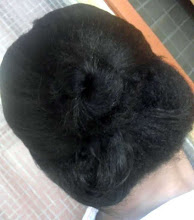Oiling your scalp is quite a controversial topic within the hair world for the reason that some advocate that you do so to help prevent dry scalp whilst others are of the view that your sebum is enough to hydrate your scalp. The question is how much sebum do you have? Is it enough?
The main concern with oiling your scalp has to do with clogging the pores with thick oils that prevent your scalp from receiving the nourishment it needs as well as adding to the sebum you have. In some cases, I've found my sebum production to be low and as such oiling the scalp was a good way of ensuring no dryness. On the other hand, when I go overboard with the application of the oil, I experience itchy scalp.
When you oil your scalp, it doesn't need to be a daily routine if your scalp doesn't like it. Itchy scalp means you need to cleanse it and applying oils to the scalp might require regular cleansing. There are people with scalp conditions that can only be soothed with oiling the scalp.
The bottom line is to pay attention to how your scalp responds to oiling and do what's best for it.
The main concern with oiling your scalp has to do with clogging the pores with thick oils that prevent your scalp from receiving the nourishment it needs as well as adding to the sebum you have. In some cases, I've found my sebum production to be low and as such oiling the scalp was a good way of ensuring no dryness. On the other hand, when I go overboard with the application of the oil, I experience itchy scalp.
When you oil your scalp, it doesn't need to be a daily routine if your scalp doesn't like it. Itchy scalp means you need to cleanse it and applying oils to the scalp might require regular cleansing. There are people with scalp conditions that can only be soothed with oiling the scalp.
The bottom line is to pay attention to how your scalp responds to oiling and do what's best for it.


Comments
Post a Comment
Speak your mind; I love to hear from you!